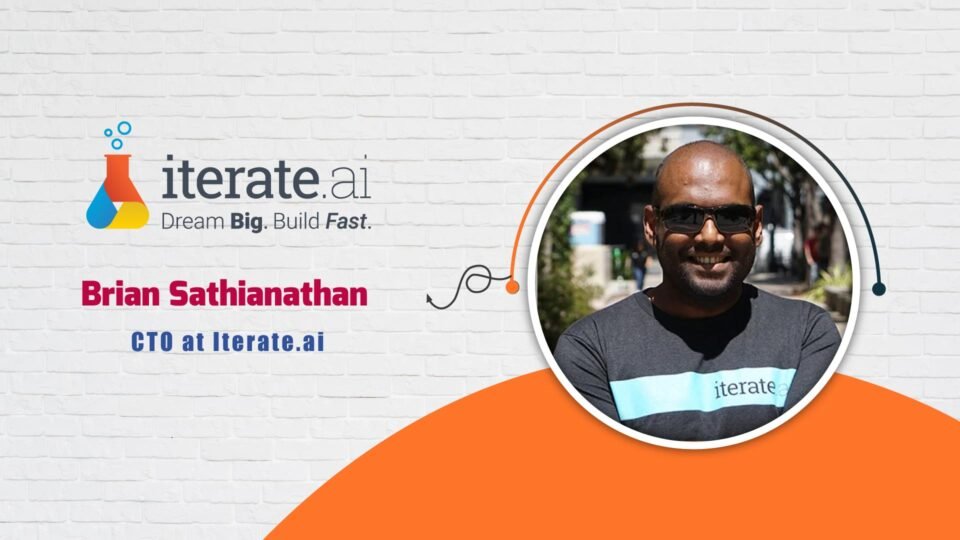What specific features of Iterate.ai make it a catalyst for growth in low-code development and deployment of AI-centric enterprise applications?
AI, without a doubt, is revolutionizing low-code development and Iterate.ai is acting as a catalyst for growth. In order to get insights into how the platform accelerates the development and deployment of AI-centric enterprise applications, we interviewed its CTO Brian Sathianathan. He speaks about his journey and how Iterate.ai empowers them to develop and deploy digital solutions faster, enabling enterprises to go to market 17x faster with their digital initiatives.
Below are the interview highlights:
1. How did Iterate.ai get started and what initially led you to you co-found it?
My business partner Jon Nordmark and I met a decade ago when we both served as board members at a Ukrainian-based startup accelerator. Meeting so many amazing startups building cutting-edge technologies gave us an idea: there should be a search engine to help organizations identify and tap into global startups’ innovations. Businesses could find the exact nascent capabilities they needed to achieve their specific goals. We founded Iterate in 2013 with Curate as our AI-curated database platform, which now evolved into our Signals platform that tracks over 16 million startups and enterprises, and the technologies they offer.
This led us to recognize the difficulties established enterprises were facing when trying to connect their legacy systems with the innovative software that the companies in our database provided. In 2017 we launched Interplay, a low-code AI platform that vastly simplifies integrations between legacy software and cutting-edge solutions, and accelerates software development by as much as 17x.
2. What technologies are particularly exciting to you right now?
AI/ML is having an extremely exciting moment right now. The technology is poised to deliver on its promise and have transformative impacts across nearly every industry. Anyone following technology news is bearing witness to the automation and new possibilities currently being opened up by ChatGPT and other generative AI solutions. To mention a few particular examples of AI/ML utilization, we’re seeing enterprises in the retail sector leveraging AI/ML and low-code to rapidly iterate and optimize customer experiences. Retailers are also now achieving accurate AI contextualization that can understand and deliver on customers’ needs at the moment. For another example, enterprises in the manufacturing sector are now leveraging powerful AI/ML oversight applications to achieve preventative maintenance and eliminate costly downtime.
Stemming off of these examples, interactive voice technology is another exciting area that will grow rapidly in tandem with AI/ML-powered solutions. IoT and edge computing technologies are also seeing exciting advances, many of them growing hand-in-hand with sophisticated AI/ML oversight applications. The technology is there, but efficiently harnessing AI (and doing so quickly) is the challenge right now.
3. How does Iterate.ai’s platform, Interplay, differentiate in the low-code space?
To our knowledge, Interplay is the world’s only low-code AI environment that enables developers to rapidly prototype applications using low-code and then put that same code to work in high-scale enterprise production environments. Interplay’s drag-and-drop interface includes hundreds of modular components that make it simple for developers to harness cutting-edge AI/ML, IoT, blockchain, data access, and countless other emerging startup-based technologies. Importantly, developers can harness these technologies without, say, needing to be AI experts. As I said, Interplay can accelerate application development by 17x, while enabling enterprises to modernize their legacy stacks and take full advantage of some of today’s most exciting technologies.
4. What kinds of companies work with Iterate.ai’s technologies?
Our platforms have proven their value to enterprises across a broad set of industries and myriad use cases. Ulta Beauty, the largest beauty retailer in the United States, uses our Interplay low-code platform to develop and deploy its versatile guest services chatbot, an AI-powered virtual beauty advisor, and other differentiated customer experiences. Pampered Chef leverages Interplay to offer a first-of-its-kind interactive digital platform that allows customers to host and attend virtual cooking parties and other events. Another example we’re proud of: Interplay powers AI-based weapons detection technology that’s currently in place at locations such as schools and stores, offering early warning of developing threat scenarios.
5. How do Signals fit into the Iterate solution ecosystem?
Signals provide a searchable, AI-curated database of over 16 million innovative technology providers, complete with details including their funding, patents, headcount, and specific capabilities. Our Signals and Interplay platforms form an ecosystem that allows enterprises searching for cutting-edge technology partners to identify them with Signals, and then easily and successfully integrate that new technology with their legacy stacks using Interplay and AI-fueled low-code.
6. In your opinion, how important is it to augment AI and ML so that they can be utilized to their fullest potential, and not be a substitute for human skills?
Deployed strategically, AI/ML can certainly formulate accurate conclusions that go beyond human limits—and those capabilities should be encouraged.Enabling real-time predictive maintenance on factory floors is one such example. As far as the discussion over AI/ML substituting human skills, low code may offer a suitable analogy for my viewpoint on how AI/ML should best be considered and utilized. Much like low-code, AI/ML has a transformative power to free personnel from tedious tasks and provide automation and augmented processes that multiply their effectiveness.
7. How important is it for businesses’ performance and customer experiences to be thinking AI right now?
AI is do-or-die for so many businesses right now. Whether the focus is internal experiences, CX/DX, or process efficiency improvements and more effective safeguards, AI is now required to create and implement the features and innovations that are necessary for growth. From a competitive perspective, businesses that manage to harness AI to deliver superior and more responsive experiences and capabilities than their competitors will likely find those advantages decisive in the marketplace.
8. How do you see the low-code / no-code space evolving in the context of AI/ML?
AI expertise remains rare and expensive, but demand for AI developers is skyrocketing. Companies trying to recruit and retain that AI talent face tremendous expenses and competition, and something’s got to give. I think the answer is in low-code and no-code. Low-code and no-code solutions democratize access to AI so that even non-developers (in some cases) can assemble applications that harness advanced AI/ML capabilities. But even those companies with rare and expensive AI talent on hand can leverage low-code and no-code to eliminate lower-value busywork and get greater efficiency from those investments. Therefore, I see low-code and no-code as the means by which most companies gain their AI/ML application development capabilities going forward.
9. How do you plan to scale up Iterate.ai’s growth in 2023 and beyond?
Iterate.ai has been bootstrapped from the start, scaling off of limited initial funding into a fast-growth company nearing 100 employees. Revenues from our Interplay low-code platform alone have grown 119% in the past year. We plan to continue as we have without influxes of VC funding, growing on the strength of our toolset and the innovation and competitive advantages we unlock for enterprises.

Brian Sathianathan
CTO at Iterate.ai
Brian Sathianathan is the Chief Technology Officer at Iterate.ai. Previously, Sathianathan worked at Apple on various emerging technology projects that included the Mac operating system and the first iPhone.

